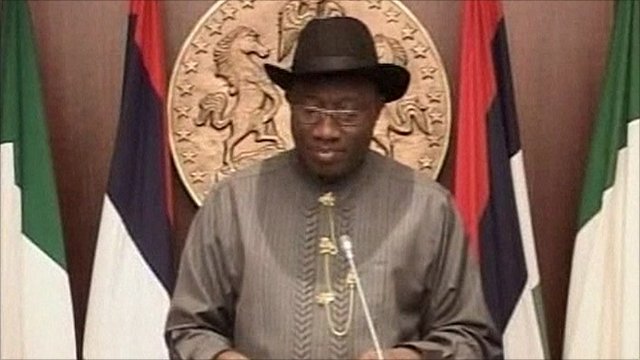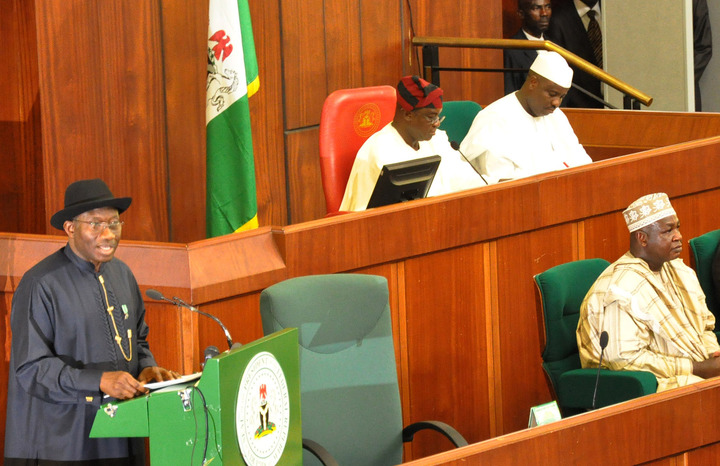Oil Benchmark – House of Reps vs Okojo Iweala: Who Holds the Superior Arguement?
The Appropriation Bill President Goodluck Jonathan submitted to the National Assembly last Wednesday quoted $75 as the Benchmark, while the house has insisted on $80 oil benchmark.
The executive have warned that anything above $75 would hurt the economy while, the house argues from the premise that the $80 oil benchmark would ease pressure on exchange rate, reduce domestic borrowing and the inflationary rate.
This development might as well delay the passage of the 2013 appropriation bill because the House and the presidency have been at loggerheads over the execution of the 2012 Budget and would not want to recount the same situation again.
House Speaker, Hon. Aminu Tambuwal, who also fortified the National Assembly’s stance on the budget, refuted allegations of bitterness between the legislature and the executive.
Passing the MTEF and FSP on October 9, the House had nailed oil benchmark at $80 per barrel and anticipated crude oil production level to stay at 2.526mbpd for 2013, 2.610mbpd for 2014 and for 20152, 648mbpd.
In addition, the House Committee Chairman on Finance, Dr. Abdulmumin Jibrin faulted the executive’s resolve to attach revenue projection in the 2013 Budget on the $75 oil benchmark in the Appropriation Bill, as stated in the official MTEF.
According to a copy of the MTEF and FSP approved by the House, “the 2013 – 2015 MTEF and FSP should have been submitted to the National Assembly on or before September 1, 2012, in strict compliance with the provisions of the Fiscal Responsibility Act (FRA) 2007”.
“The 2013 – 2015 MTEF and FSP submitted did not evaluate macroeconomic projections such as GDP growth rate and inflation for the preceding three years as stipulated in section 11 (3a) of the FRA 2007. Many submissions from various government agencies were at variance with estimates in the 2013 – 2015 MTEF and FSP implying that the process of preparation may not have been as inclusive as it ought to be in line with section 13 (2b) of the FRA 2007”.
“The exchange rate (of N160 to $1) proposed in the 2013 -2015 MTEF and FSP is reasonable even though a high exchange rate of this nature might lead to a market speculation and high inflation rate.”
“There are revenue leakages relating to oil production such as pipeline vandalism, crude oil theft and inability to determine actual output and the MTEF and FSP did not describe the nature and fiscal significance of government contingent liabilities, quasi fiscal activities and measures to mitigate the crystallisation of such activities as stipulated in section 11 (3e) of the FRA 2007,” the report added.
According to a report jointly signed by Jibrin and others said, the recommendations in the MTEF and FSP should to have been contained in the 2013 Budget before its appearance before the National Assembly.
Stating reasons as to why the House is adamant over the $80 oil benchmark, Jibrin said, “The Minister of Finance, Dr. Ngozi Okonjo-Iweala, has painted a gloomy situation of what will happen, if there is a benchmark of $80; but that does not reflect the actual situation on ground. It is not only in the Euro zone that there is a crisis. There is also a crisis in the Middle East. There is a crisis in the Sudan and the US economy is picking up.”
“The basic question to be asked is what percentage of the Nigeria crude does the Euro zone purchase? The Minister of Finance compared the Nigeria benchmark with the OPEC countries, but this is not a fair way to look at the issues at hand. In such comparison, it is fair to know what the countries in question are doing with their surpluses, size of their deficit, savings and borrowings. It is on this ground that the basis of the comparison must be understood.”
“The reality is that most of these countries use their surpluses to balance their deficits. They save and borrow in a reasonable and transparent manner.”
He also elucidated that, the persistence on the $80 oil benchmark is to eliminate pressure on the exchange rate, trim down domestic borrowing, and the inflationary rate that the $75 oil target would bring about.
Jibrin, who lamented the assumed starving of revenue generating agencies of funds, said this might impinge on the actualisation of the 2013 revenue target.
He also asked Nigerians to not to fault the legislature if the passage of the 2013 budget is delayed as the current one is still pending.
The speaker, who spoke on the disagreement with reporters at Irun Akoko, Ondo State yesterday, when he paid a visit to a member of the House who lost his wife, Hon Gani Dauda, insisted that the house has presented its premise for their stand.
“We are not against the president. We are only demanding from Mr. President what is right. If he gets it right, it is for his own benefit because the credit will go to him.”
“We are all in government to achieve the same goal. When a co-traveller is demanding that a proper thing should be done, nobody should see that as being antagonistic.”
“We are not at loggerhead with the presidency. They have submitted their estimate and we are looking at it.”
He said, “Since we know that we will get up to $80 per barrel, we want it to be pegged at $80 so that we will not go and be borrowing from banks.”
Okonjo-Iweala, on the other hand, warned that it will not benefit the economy if the oil benchmark is $75.
The $75 per barrel oil benchmark is founded on the ‘oil-price based fiscal rule’ as summarized in the Fiscal Responsibility Act, 2007, she said.
“We used the model to estimate five-year and 10-year moving averages of the oil price and arrived at our own average of approximately $71/barrel, which was then, rounded up to $72/barrel (the 2012 Budget level).”
“This is a standard technique commonly used by commodity-dependent countries to protect them against the volatilities of oil. Following consultations with various stakeholders, including governors and the National Assembly, it was agreed that the benchmark price should be further rounded up to $75/barrel to meet pressing needs and prevent delays in the budget process. This $75/barrel price represents an upper limit from our model, if Nigeria is to maintain a stable macroeconomic environment for next year,” the statement said.
According to her, the $80 oil benchmark proposal, if accepted, would lead to an increase in liquidity, and it would be harmful for many of government’s macro-economic forecasts.
“Based on our estimates, inflation rates would certainly rise significantly. The exchange rate would come under severe pressure, leading to a depreciation of the naira. High inflation would result in higher interest rates. A combination of high inflation, interest rate and an unstable exchange rate is bad for economic planning, both for the government and for private businesses. Overall, we know that macroeconomic volatility is bad for growth.
“Second, the legislature’s proposal is premised on an overly-optimistic outlook of global oil prices. The current world oil price is not based on actual economic fundamentals, but rather on uncertainties due to conflict in the Middle East. Nigeria cannot base its plan simply on the expected misfortunes of others!”
“Third, in our view, current global oil prices are not sustainable. There are two reasons for this, possible reduction in global oil demand, due to recession in the Euro zone, low growth in the US, and economic slowdown in China and India as well as increased global oil supply as new discoveries in Africa and elsewhere come on stream. In addition, with the end of the Libyan crises, approximately 1.6m barrels per day would be returned to the world market.”
“Fourth, the legislature’s proposal would result in much lower savings in the ECA. To be precise, it would deny the ECA of significant additional inflow. These savings are necessary to cushion the impact on the Nigerian economy, in the event of a global economic recession or a slump in world oil prices,” she added.










Henry Uchenna
October 16, 2012 at 9:33 am
In my opinion I think the minister of finance has a more superior argument and her concept is more robust. We shouldn’t base the budget on overly optimistic ideas as the national assembly plans to.
The 75$/ barrel benchmark is more appropriate
Ahmad
October 16, 2012 at 1:51 pm
Indeed the minister has a superior argument it took everything into consideration, the Reps argument is very superficial and vague
EMMAH
October 16, 2012 at 2:36 pm
law making and financial policy of any country should better be handled by experts on the various fields. working on assumption must have adverse effects. The house of representative should examine the reasons given by the finance minister and give peace a chance.